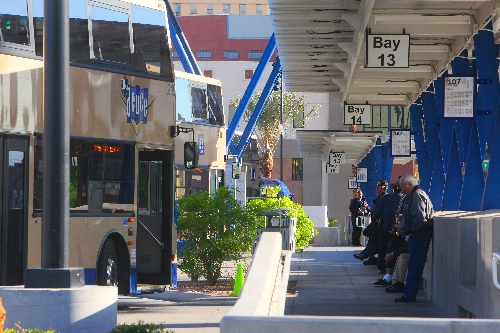Transit employees voice concerns about contract
As two multinational companies battle for the most lucrative public service contract in the nation, bus drivers and mechanics -- the employees most likely to be affected by the outcome -- are furious that their voices have not been heard.
Armed with a petition bearing signatures of 886 of 1,081 workers showing support for Veolia Transportation, employees claim the union president and treasurer have openly lobbied for rival First Transit and bashed Veolia without polling members or allowing them to vote on their preference.
"Why do they have their own agenda? Why aren't they asking us? Where's the union's voice?" asked mechanic Shane Wunder.
A slight majority of drivers and mechanics who operate and keep the Regional Transportation Commission's coaches running are not members of the Amalgamated Transit Union, but the labor organization's board negotiates the collective bargaining agreement for all employees.
The Transportation Commission postponed its decision on who would secure a three-year contract that offers a pair of two-year extensions. The contract is worth about $80 million a year. The board held off on a vote to have a financial analyst study whether First Transit can provide the required services for its bid, which over seven years was $50 million less than Veolia.
Union treasurer Jeff Raske and president Jose Mendoza have spoken at commission meetings regarding the contract.
The employees who signed the petition and spoke about their frustrations were both union and nonunion workers. They acknowledged that they were partly anxious about any change, but said First Transit's figures were suspicious. They said they can't help but wonder whether there will be layoffs or cuts in pay and benefits, even though Jacob Snow, general manager for the Regional Transportation Commission, said the request for proposal says the new company cannot lower pay and benefits.
Linda Johnson-Sanders, a union member, said Veolia never asked employees to circulate a petition; it was the only manner in which drivers such as herself felt they could be heard.
"I felt like I was taking a chance," she said of placing her name on the paper. "But I wanted my voice to be heard."
VEOLIA PRAISED
Johnson-Sanders and Robert Doran, a mechanic, praised Veolia's benefits and treatment of employees. Johnson-Sanders said she underwent major surgery recently and paid no money out of her own pocket. She also emphasized that even with the poor economy, Veolia has never laid off drivers.
Doran said both his parents died in 2009 and with only five days of personal time off, he expected to struggle to pay bills when he returned from a two-week trip home. Doran said he received a full paycheck with the understanding he could make up the time.
Wunder, who declined to become a union member because he did not believe the leadership represented its members well, said he and his fellow employees are concerned about the numbers included in the two transit companies' bids.
First Transit lists its first-year labor costs as $43 million, Veolia's figure is $45 million; First Transit's subcontracting budget is about $8 million, Veolia's is about half that. Veolia budgeted $4 million more toward benefits and about $2 million toward vehicle parts. Veolia has a $4 million edge on the profit margin.
To employees who support Veolia, those numbers in the bid translate to outsourcing services, staff reductions and poorly maintained vehicles.
"How are they going to afford parts to fix buses unless they have some screaming deal?" Wunder said.
Gino Cunanan, also a mechanic, said when he questioned union representatives about why a vote had not been taken, he was told: "Not everything has to go to vote."
The employees' contract with Veolia expired in December and union members question why their leaders are focused more on lobbying for First Transit than negotiating a new contract.
"We are now working with no contract," said driver Sandra Neale. "If he (Mendoza) was more for us, he'd have more people in the union."
CONTRADICTORY STATEMENTS
Raske, the union treasurer, said the pair are only interested in which company will engage in good-faith bargaining.
"We don't particularly have any objections to either Veolia or First Transit getting the contract as long as they abide by the contract we enter in," Raske said, adding that he and Mendoza were in negotiations with Veolia on Thursday.
Raske's comment contradicts statements made in an April 12 memo to union members in which he said, "I will tell you that I personally want them (Veolia) gone." Raske went on to say, "Tell Veolia that as a Marine sniper in Vietnam I met a formidable enemy and survived. I WILL NOT be intimidated by anyone and you messed with the wrong guy." He signed off, "Semper Fi!"
Raske said his personal feelings do not spill over into his official duties as a representative of the union. "I'd rather see First Transit over Veolia, but my personal choice wouldn't matter," he said.
Raske added that if union members wanted to vote on the matter, somebody could have requested to do so during a meeting. Nobody did, he said.
Valerie Michael, spokeswoman for Veolia, dismissed rumors that her company is spreading misinformation and forcing workers to sign the petition. She said employees have chosen on their own to speak up and circulate the petition.
"They did that themselves," she said. "I think it speaks volumes about where they want to be. It says it all."
Terry Murphy, a consultant for First Transit, said the huge discrepancy between bids is a result of First Transit being a very conservative company. She said the only layoffs planned are supervisory positions and only about five jobs are expected to be eliminated.
The only potential scenario that could adversely affect rank-and-file positions is if routes are eliminated, and that decision must come from the Regional Transportation Commission.
"We do not anticipate reducing the number of drivers, we do not intend to get rid of any people on the floor," she said.
The contract allows for 40 part-time positions and First Transit would probably allow fewer than that and the services subcontracted out would be along the same lines as Veolia's policy. Benefits, she said, must be negotiated at the bargaining table.
Murphy said company officials are frustrated by the misinformation being provided to employees.
"We can't have access to the job site, we don't have access to their mailing list; there is nothing we can do," she said. "What they're being told is one-sided."
Contact reporter Adrienne Packer at apacker@reviewjournal.com or 702-387-2904.




























